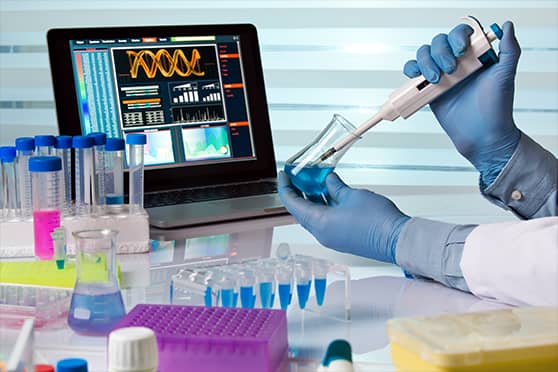Summary
Physics, Chemistry and Biology in Class XI-XII are needed to pursue a BSc course in Biomedical Science
Drug discovery and understanding the biochemical aspects of different diseases is part of Biomedical Sciences
Do you want to keep in touch with the latest inventions in the medical field? Here’s some news: you can do that without being a licensed physician. A career in Biomedical Science offers insights into what’s happening behind the scenes and the chance to get involved in the excitement of new breakthroughs in the healthcare sector.
What is Biomedical Science
Biomedical Science is a mix of Biology and Medicine that involves a thorough study of Biochemistry, Physiology, Cell and Molecular Biology, Anatomy and Histology, Epidemiology, Pharmacology, Immunology and Toxicology. Studying this specific discipline will help you work in the drug-discovery field and give you opportunities to study the biochemical nature of diseases to hit upon perfect solutions.
Differences between MBBS and Biomedical Science courses:
- The MBBS course revolves around diseases, treatments, cure techniques and prevention, while Biomedical Science resorts to Cell Biology and Molecular Biology to understand different pathways and molecules.
- Though both courses have similar course content at the beginning, the approaches are different. The MBBS course is more patient-centric, while the Biomedical Science course focuses more on theory, treatment methodology and lab work.
- Biomedical Science looks more deeply into the biochemical nature of diseases and drugs, while the MBBS course is aimed to produce physicians who would be responsible for the health of an individual or a community.
Studying Biomedical Science:
- You need to clear the Class XII board exams with Physics, Chemistry and Biology as compulsory subjects.
- You need to sit for the entrance exams conducted by different universities to enrol in a BSc course in Biomedical Sciences. Admission to some of the courses are also based on merit.
- After graduating in Biomedical Science, you become eligible for a master’s degree in Biotechnology, Microbiology, Genetics, Biochemistry and Life Sciences.
- You can enrol in a PhD course in Biomedical Science with a public health background or an MSc degree in related subjects like Microbiology or Biochemistry.
Some top institutes that offer Biomedical Science courses:
University of Delhi
Course: BSc in Biomedical Science.
-
Duration: 3 years.
-
Eligibility: You need to get at least 60% aggregate in your Class XII board exams or any equivalent exam with Physics, Chemistry, Biology as compulsory subjects to appear for Common Entrance Test (CUCET).
-
Admission: This depends on your rank in CUCET and your performance in a personal interview.
-
Click here to learn more.
Dr B. R. Ambedkar Centre for Biomedical Research (University of Delhi)
Course: MSc—PhD combined degree in Biomedical Research.
-
Eligibility: You need at least 55% aggregate in your BSc exams in any relevant science subject from the University of Delhi or any other university recognised by the University of Delhi to become eligible for the Common Entrance Test (CET).
-
Admission: This depends on your rank in the entrance test and your performance in a personal interview.
-
Click here to learn more.
University of Hyderabad
Course: PhD in Health Sciences.
-
Duration: 6 years.
-
Eligibility: Candidates can come from either a public health background or any scientific background that’s related to Biology and Medicine:
- Public Health background: You need at least 55% aggregate in your master’s exams or any equivalent exam in any stream of Biomedical Science, including Indian Systems of Medicine, Life Sciences, Applied Sciences, Allied Health Sciences, Nursing, Health Management and Health Administration, Social and Behavioural Sciences.
- Science stream: You need at least 55% aggregate in your master’s exams in Biochemistry/Animal Sciences/Biotechnology/Biosciences/Toxicology/Pharmacology/Microbiology/Biosciences. Only JRF-qualified candidates are considered.
Gujarat University
Course: MSc in Biomedical Technology.
-
Duration: 2 years.
-
Eligibility: You need a BSc degree in Biological Sciences to become eligible for the Common Entrance Test (CET).
-
Admission: Depends on your rank in CET.
-
Click here to learn more.
Vellore Institute of Technology
Course: MSc in Biomedical Genetics.
-
Duration: 2 years.
-
Eligibility: Depends on your performance in the BSc exams. The required cut-off is set by the institute every year.
-
Admission: Merit-based.
-
Click here to learn more.
Job roles with a degree in Biomedical Science:
-
Clinical research coordinator: They primarily administer and conduct clinical trials, monitor willing participants, analyse data and prepare reports. They conduct trials to test the efficiency of a medical procedure, drug or technology.
-
Biostatistics manager: They use statistical methodologies in areas of public health, medicine and biology. They deal with problems in the public health sector.
-
Biomedical scientist: From handling samples to testing and finding new strains and taking preventive measures, their work is laboratory-based. You can choose your domain of research according to your interest.
-
Clinical haematologist: They detect diseases by studying the characteristics of blood samples. Their research is specific in the field of diseases associated with blood and how it affects other organs.
-
Forensic expert: They identify, study and test specimens collected from crime scenes. It’s their job to analyse samples collected from crime scenes to find out the exact cause of death.
Last updated on 01 Apr 2022

